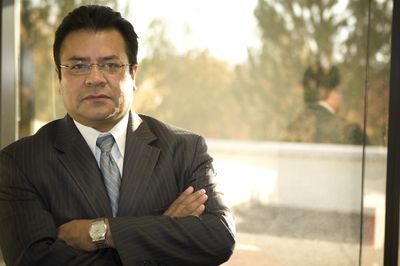Consul ready to serve
Mexican diplomat heads new office in Boise

BOISE – The newest Mexican consulate on United States soil consists of a couple of folding tables, an office copier, a fax machine and an eager diplomat named Ricardo Pineda.
Less than a month into the job, Pineda is head of a consulate that was protested by an Idaho congressman long before the Mexican government appointed him to run it.
A small Mexican flag is perched on the window sill of his temporary office in Boise, where the 45-year-old Mexico City native is preparing to open a permanent consulate in December.
“We haven’t had any representation here,” Pineda said. “We’ve got to test the waters.”
Pineda was tested himself when he took over the Mexican consulate in San Diego last year, two months before wildfires ravaged Southern California and destroyed more than 2,000 homes from north of Los Angeles to south of San Diego.
Pineda helped coordinate relief efforts for Mexican nationals and evacuate immigrants who didn’t want to leave after hearing false rumors that immigration authorities had established checkpoints along evacuation routes, said Alberto Lozano, a former spokesman for the San Diego consulate who now works at the Mexican Embassy in Canada.
“Every immigrant was scared,” Lozano said. “The role of Ricardo was crucial. He had the initiative to send officials to each and every shelter to speak with a great number of Mexicans who were affected by the fires.”
Later that year, Pineda would go up against the U.S. Border Patrol and insist agents stop firing tear gas and pepper-spray weapons across the border into Mexico. The agency said it was trying to repel an increasing number of attacks by assailants hurling rocks, bottles and bricks after stepped-up security made it harder for smugglers to cross the border.
Pineda worked with local, federal and Mexican governments to increase patrols and prevent further attacks, Lozano said.
“It was a touchy situation – he was mitigating between all the parts and I think he succeeded,” Lozano said. “Our first and most important duty is to protect our people whatever the circumstance is. I think he didn’t forget that.”
San Diego ties with New York City as the third largest Mexican consulates in the country and handles more than 5,000 cases a year, Lozano said. In Idaho, Pineda expects to handle about 200 cases a year.
“There was a lot of everyday issues that we’re not going to have in Boise,” Pineda said.
But there are different challenges.
Rep. Bill Sali, R-Idaho, pleaded with Secretary of State Condoleezza Rice in March to delay approval of the Mexican consulate in Idaho until the government could guarantee the office wouldn’t aid illegal immigrants.
The consulate was approved despite the objection and Pineda was assigned here in August, arriving just in time to celebrate Mexican Independence Day on Sept. 15. Mexico will have 50 consulates nationwide, with the approval of offices in Idaho and Alaska this year.
“We have to still be diligent and make sure the consulates aren’t being used to aid immigrants who are living here illegally,” said Sali spokesman Wayne Hoffman. “Maybe Mr. Pineda will make extra efforts to address those concerns.”
Supporters collected about 10,000 signatures on a petition requesting a Mexican consular office in Idaho to serve thousands of residents who have legal or family ties to Mexico.
The U.S. Census Bureau estimates 129,511 Mexicans live among Idaho’s 1.5 million residents.
The Boise consulate will also serve Montana and provide identification for Mexican nationals living abroad, such as birth certificates and passports. Previously, Idaho or Montana residents in need of these services had to travel to Salt Lake City or Seattle.
“We need to let them know that the work of our consulate is not just to provide documents,” Pineda said.
He hopes to use his position to further both trade and cultural relations between Idaho and his home country. Last year, Idaho companies exported $136.8 million in goods to Mexico, an increase of 5 percent from 2006. Pineda also wants to address what he calls misconceptions that Mexicans in the United States are “here to take jobs and commit crimes.”
“They are hardworking people,” Pineda said, “they are here to make a positive change in their lives.”
His journey to the United States began more than 10 years ago, when he left Mexico City to work for the Mexican Embassy in Washington, D.C., and worked with consulates positioned near the U.S-Mexico border for seven years before he was assigned in California, Lozano said.
“It’s not an easy task, to establish a consulate from scratch,” Lozano said, “but I don’t have any doubt that he will do it pretty well.”